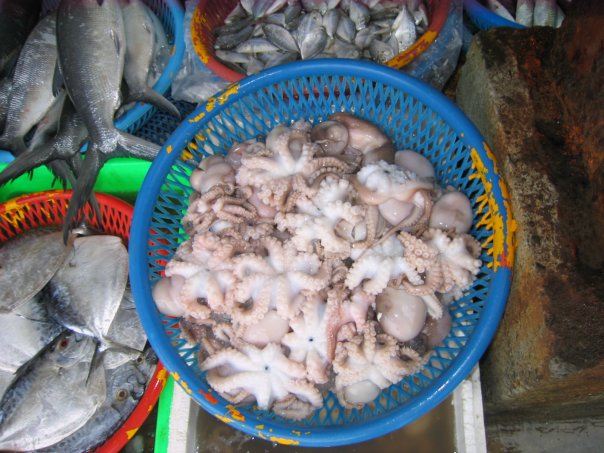
Octopus at a fish market in Indonesia.
© Deng Palomares/Sea Around Us
In the first study of its kind, researchers at UBC, the GEOMAR Helmholtz Centre for Ocean Research Kiel, and the University of Western Australia assessed the biomass—the weight of a given population in the water—of more than 1,300 fish and invertebrate populations. They discovered global declines, some severe, of many popularly consumed species.
Of the populations analyzed, 82 per cent were found to be below levels that can produce maximum sustainable yields, due to being caught at rates exceeding what can be regrown. Of these, 87 populations were found to be in the “very bad” category, with biomass levels at less than 20 per cent of what is needed to maximize sustainable fishery catches. This also means that fishers are catching less and less fish and invertebrates over time, even if they fish longer and harder.
“This is the first-ever global study of long-term trends in the population biomass of exploited marine fish and invertebrates for all coastal areas on the planet,” said Maria “Deng” Palomares, lead author of the study and manager of the Sea Around Us initiative in UBC’s Institute for the Oceans and Fisheries. “When we looked at how the populations of major species have been doing in the past 60 years, we discovered that, at present, most of their biomasses are well below the level that can produce optimal catches.”
To reach their findings, the researchers applied computer-intensive stock assessment methods known as CMSY and BSMY to the comprehensive catch data by marine ecosystem reconstructed by the Sea Around Us for the 1950-2014 period.
The greatest declines in stocks were found in the southern temperate and polar Indian Ocean and the southern polar Atlantic Ocean, where populations shrunk by well over 50 per cent since 1950.
While much of globe showed declining trends in fish and invertebrates, the analysis found a few exceptions. One of these was the Northern Pacific Ocean where population biomass increased by 800 per cent in its polar and subpolar zones, and by about 150 per cent in its temperate zone.
Despite these pockets of improvement, the overall picture remains cause for concern, according to co-author Daniel Pauly, principal investigator at Sea Around Us.
“Despite the exceptions, our findings support previous suggestions of systematic and widespread overfishing of the coastal and continental shelf waters in much of the world over the last 60-plus years,” said Pauly. “Thus, pathways for improvements in effective fisheries management are needed, and such measures should be driven not only by clearly set total allowable annual catch limits, but also by well-enforced and sizeable no-take marine protected areas to allow stocks to rebuild.”
“Fishery biomass trends of exploited fish populations in marine ecoregions, climatic zones and ocean basins” was published in Estuarine, Coastal and Shelf Science.
Tags: Daniel Pauly, Deng Palomares, fish, fish stocks, fisheries management, fishing practices, Research, Sea Around Us, sustainability